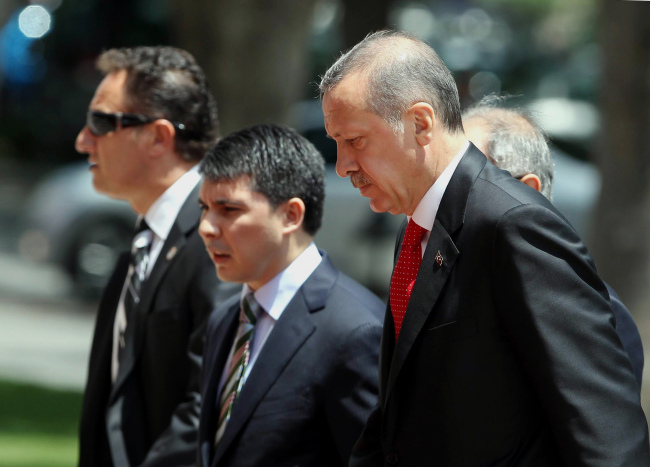ANKARA (AP) ― Turkey said Monday it would push the North Atlantic Treaty Organization to consider Syria’s downing of a Turkish jet as an attack on the whole military alliance.
The announcement came on the eve of a meeting by NATO’s governing body to discuss the incident. Despite deep frustration among many NATO countries over the conflict in Syria, where the opposition says President Bashar Assad’s crackdown on an increasingly armed popular uprising has killed 14,000 people, it’s highly unlikely the military alliance will take armed action against the Arab state.
The unarmed RF-4E reconnaissance jet was shot down 1.6 kilometers inside international airspace on Friday, and two Turkish pilots are still missing, the Turkish government said. It has insisted the plane was not spying on Syria.
Turkish Deputy Prime Minister Bulent Arinc also said for the first time Monday that Syrian forces had opened ground fire on a CASA search-and-rescue plane shortly after the downing, but did not say if that plane was hit.
 |
Turkish Prime Minister Recep Tayyip Erdogan (right) arrives for a cabinet meeting in his office in Ankara on Monday. (AP-Yonhap News) |
Arinc said Turkey retained its right to “retaliate” against what he called a “hostile act,” but he added, “We have no intention of going at war with anyone.”
Still, he added that Turkey will push NATO to consider the jet’s downing under Article 5 in a key alliance treaty. Article 5 states that an attack against one NATO member shall be considered an attack against all members.
The North Atlantic Council ― which includes ambassadors of the 28 NATO countries ― works by consensus and all members must approve any action. The meeting Tuesday comes after Turkey requested it under Article 4 of the treaty, which allows a NATO ally to request such a consultation if it feels its territorial integrity or security has been threatened.
Asked if Turkey will insist on the activation of Article 5 of NATO, Arinc said, “No doubt, Turkey has made necessary applications with NATO regarding Article 4 and Article 5.”
“It should be known that within legality we will of course use all rights granted under international law until the end,” Arinc said. “This also includes self-defense. This also includes retaliation many-fold. This includes all sanctions that can be applied to the aggressor state under international law. Turkey will not leave anything out on this issue. The public should be assured.”
The prospect of Western military intervention in Syria remains remote, despite all the tough talk.
Such action is unlikely to get the support of either the U.N. Security Council or the Arab League, and outside intervention without the blessing of both of those bodies is all but unthinkable. And there is little appetite among the NATO countries ― of which the U.S. is the largest ― for another war in the Middle East.
Arinc strongly denied Syrian claims that the downed plane was shot by anti-aircraft fire while flying low inside Syrian airspace. The Syrian government said Monday said the plane was hit by a short-range anti-aircraft gun to prove that the plane was inside Syrian territory.
Arinc, however, said Turkey believed the plane was hit with a laser-guided or heat-guided missile ― capable of hitting the plane in international airspace.
The deputy premier admitted the jet mistakenly strayed into Syrian airspace when it was flying at an altitude of 200 feet and at a speed of 300 knots, but said it left the Syrian airspace after warnings from Turkish radar operators and that it received no warning from Syrian forces during its five-minute flight inside Syrian territory.
“It was hit while flying 13 miles away (from the Syrian coast) at an altitude of 7,400 feet,” Arinc said. “It leaned on its left side and fell steeply for four miles toward the east.”
Arinc said the plane crashed into Syrian waters and its wreckage is believed to be 1,000 meters below sea level. Arinc also said Syria was misleading the world when it says its forces could not recognize the plane until after it was downed.
He said the plane’s electronic signals, which indicate if an aircraft is friend or foe, were activated during the entire flight and that Turkey even intercepted radio conversations in which Syrian forces referred to the plane. Arinc did not elaborate, but Hurriyet newspaper, citing intelligence sources, said Monday that Syrian forces referred to the plane using the Turkish word for “neighbor” ― “komsu” ― in an intercepted radio conversation.
Arinc reiterated Turkey’s insistence that the plane was not spying on Syria but just testing Turkey’s radar capabilities.
“There is no doubt that Syrians deliberately targeted our plane in international airspace,” Arinc said. “It was an extremely hostile action.”
He accused Syria of acting in a “cold-blooded” manner.








